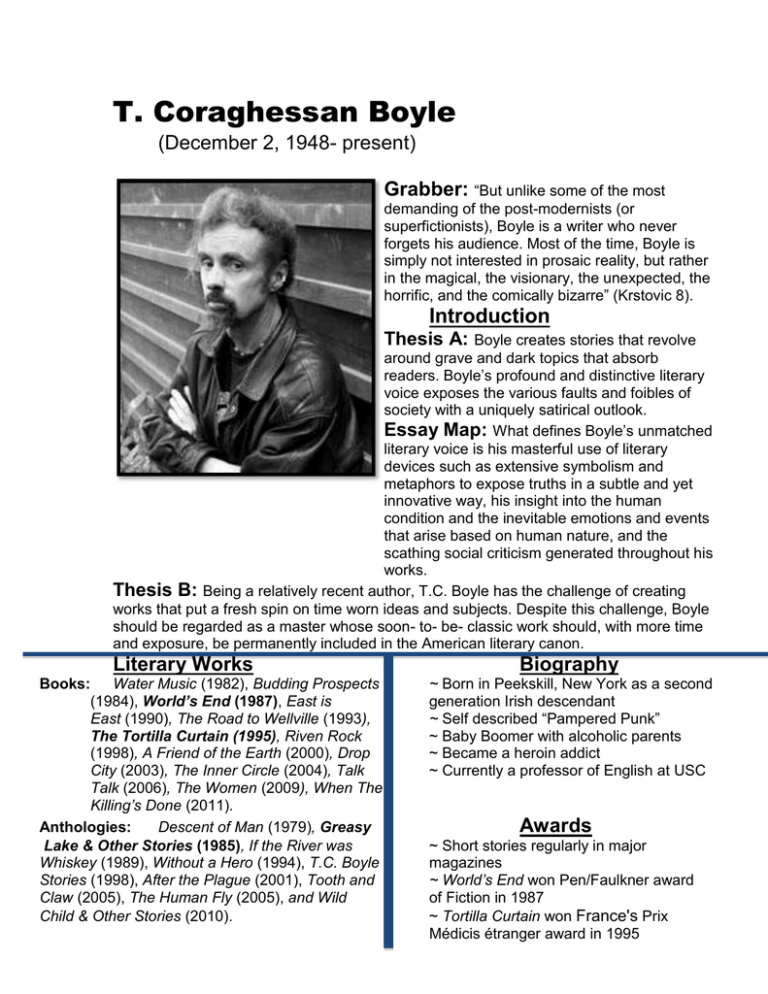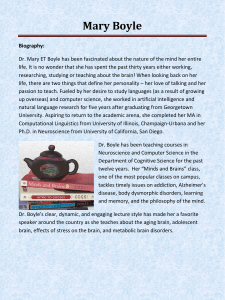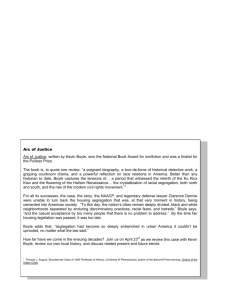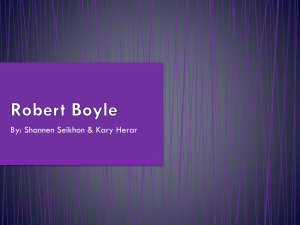Essay Map
advertisement

T. Coraghessan Boyle (December 2, 1948- present) Grabber: “But unlike some of the most demanding of the post-modernists (or superfictionists), Boyle is a writer who never forgets his audience. Most of the time, Boyle is simply not interested in prosaic reality, but rather in the magical, the visionary, the unexpected, the horrific, and the comically bizarre” (Krstovic 8). Introduction Thesis A: Boyle creates stories that revolve around grave and dark topics that absorb readers. Boyle’s profound and distinctive literary voice exposes the various faults and foibles of society with a uniquely satirical outlook. Essay Map: What defines Boyle’s unmatched literary voice is his masterful use of literary devices such as extensive symbolism and metaphors to expose truths in a subtle and yet innovative way, his insight into the human condition and the inevitable emotions and events that arise based on human nature, and the scathing social criticism generated throughout his works. Thesis B: Being a relatively recent author, T.C. Boyle has the challenge of creating works that put a fresh spin on time worn ideas and subjects. Despite this challenge, Boyle should be regarded as a master whose soon- to- be- classic work should, with more time and exposure, be permanently included in the American literary canon. Literary Works Books: Water Music (1982), Budding Prospects (1984), World’s End (1987), East is East (1990), The Road to Wellville (1993), The Tortilla Curtain (1995), Riven Rock (1998), A Friend of the Earth (2000), Drop City (2003), The Inner Circle (2004), Talk Talk (2006), The Women (2009), When The Killing’s Done (2011). Anthologies: Descent of Man (1979), Greasy Lake & Other Stories (1985), If the River was Whiskey (1989), Without a Hero (1994), T.C. Boyle Stories (1998), After the Plague (2001), Tooth and Claw (2005), The Human Fly (2005), and Wild Child & Other Stories (2010). Biography ~ Born in Peekskill, New York as a second generation Irish descendant ~ Self described “Pampered Punk” ~ Baby Boomer with alcoholic parents ~ Became a heroin addict ~ Currently a professor of English at USC Awards ~ Short stories regularly in major magazines ~ World’s End won Pen/Faulkner award of Fiction in 1987 ~ Tortilla Curtain won France's Prix Médicis étranger award in 1995 Distinctive Features of Boyle’s Work 1. Masterful use of literary devices A. Literary Example: “I’ve never seen anything so moving, so emotionally ravaging in my life—he began to cry…great wet heaving sobs tearing t his lungs, the riveting blue eyes that had gazed with equanimity on the most heinous scenes of devastation known to civilized man reddened with a sorrow beyond despair” (Greasy Lake & Other Stories, 40). B. Critical Quote: “characterized by comic irreverence, dark humor, occasional somber irony, and an eclectic prose style that employs both formal and colloquial language that has been described as, by turns, playful, bawdy, and lyrical... themes and motifs introduced in his earliest stories recur throughout his short fiction... variety of plot, characterization, style, and tone in Boyle’s short story oeuvre” (Krstovic 1). 2. Insight into the Human Condition and Human Nature A. Literary Example: “Before we could pin her to the hood of the car, our eyes masked with lust and greed an the purest primal badness… there we were, dirty, bloody, guilty, dissociated from humanity and civilization…shreds of nylon panty and spandex brassiere dangling from our fingers, our flies open, lips licked” (Greasy Lake & Other Stories, 6). B. Critical Quote: “And like many satirical works remind readers of the nature of the body and the inescapable animal side of human beings” (Lyons 74). 3. Scathing Social Criticism A. Literary Example: “I admit it. I was an optimist, I was aggressive, I believed in man and in science, I challenged the heavens and dared to tamper with the face of the universe and its inscrutable design—and I paid for it swiftly” (Greasy Lake & Other Stories, 127). B. Critical Quote: “Almost all of his novels and stories have used comedy of one sort or another to serve moral purposes such as exposing greed, racism, and cultural insensitivity, satirizing contemporary foibles and obsessions, or deflating pomposity” (Lyons 73). 4. How should Boyle’s work be regarded? A. Calvino Quote: “In a classic we sometimes discover something we have always known (or thought we knew)” (Calvino) B. Bloom’s List: T.C. Boyle is too recent to be included in Bloom’s literary canon (536) C. Critical Quote: “T. Coraghessan Boyle has emerged as one of the most inventive and verbally exuberant writers of his generation” (World’s End backcover).



